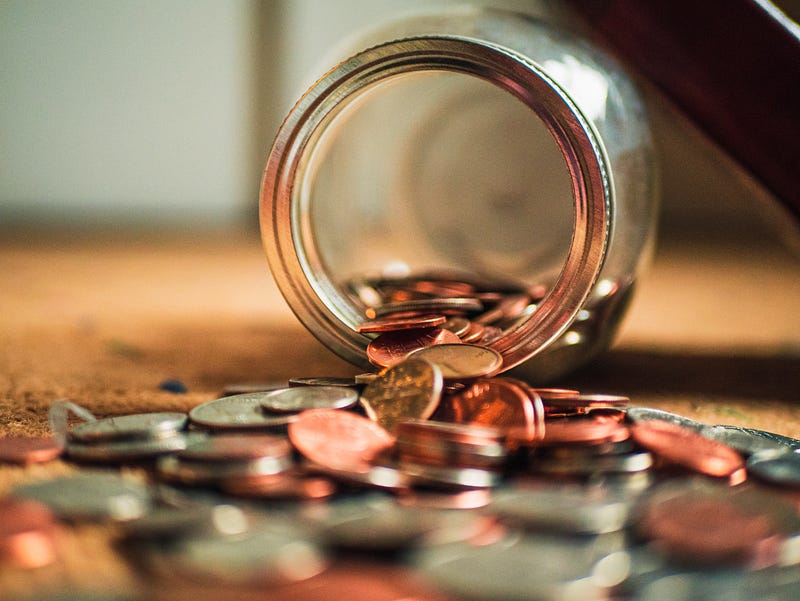Saving Money Is A Privilege

When something goes wrong, like a job loss or a car accident or an illness, it’s not uncommon for people to say, “Well, that’s what savings are for,” or “At least you have an emergency fund.”
We are surrounded by reminders that we are supposed to save money early and often — retirement! 401Ks! compound interest! And we’re all told to fear living paycheck to paycheck because the money will run out.
I’m not here to argue with the fact that saving money is something we should all do, but I do take issue with the idea that it’s something everyone can do. The simple reality is that to function in society, at certain income levels, there’s no choice but to live paycheck to paycheck.
When I was 28, I made somewhere between $32K and $36K per year. After paying taxes as well as taking out money for health insurance and parking at work, this amounted to about $2,000 per month.
This is what my monthly budget looked like:
$750 mortgage (Which is way lower than most rents and only possible because my parents helped me with a 20% down payment on my house.)
$300 gas/water/electric (I didn’t have cable or WIFI at the time. Here I’ll give a long-delayed thank you to my old neighbors for the unsecured Internet.)
$100 car insurance
$100 gas
$90 medication (This was all antidepressants because I like not having intrusive thoughts that my life isn’t worth living.)
$65 cell phone
= $1405*
So, that leaves $600 for the month or $150 for the week for everything else — groceries, clothes, entertainment, unexpected emergencies (like co-pays at the doctor’s office or buying shampoo). Also, let’s keep in mind that your 20s tend to be the time in life when everyone gets married, so I was paying for a lot of wedding showers, wedding gifts, bachelorette weekends, etc.
I think social interaction is really important, too, because if you’re holed up in your house all the time worried about money, your mental state is going to deteriorate pretty quickly, and sometimes you need to spend some money on some beers so you can see your friends.
Yes, you can look at this budget and say, “You could save $20 a week. Come on!” And you could. You’d be sacrificing something, but that $20 per week becomes $500 per year, and then well, you’ve got $500 that will turn into a $20K down payment on a house in a short 40 years!
The basic fact of the matter is this: It’s a lot easier to save money when you make $75K, or better yet $175K, per year as opposed to $35K per year, and the gulf between those salaries often isn’t closed in a lifetime.
As a culture, we continually tell people without enough money that it’s their fault they don’t have more money. We treat having or not having money as a moral failure rather than an economic reality.
If for any reason you don’t believe me on that last one, consider this: it’s considered reasonable to say that you’ll give money to panhandlers, but only if they won’t spend that cash on cigarettes or booze. We don’t tell rich people that they can’t drop $2500 on a nice bottle of wine if they can afford it, but we absolutely police the consumer choices of the poor.
I don’t think it has anything to do with the fact that we think poor people don’t have money because they spent it all on alcohol. I think it’s because we consider poverty a failure, and in America, failure makes you a bad person, so we get to tell you how to live your life from here on out. (After all, you already messed it up once, so forget having nice things.)
For further proof, consider this: Many states put restrictions on food stamps saying that you can’t use EBT for seafood or organic produce. There is absolutely no reason anyone on food stamps should have their benefits restricted at the grocery store unless you believe that what you get to eat is also a punishment for how you’ve lived your life. Can’t find a job that makes at least $50K? No crab for you.
To live in America today, you have to make a certain amount of money to survive. It isn’t possible for everyone to save, and we have to stop acting like not having savings is a fatal mistake on the part of the individual rather than an indicator of a capitalist society content to leave large segments of the population behind.
Shame for not having savings doesn’t belong to individuals with low salaries. Shame for not saving belongs to a system that has kept wages low while housing prices and wealth generation skyrocket.
Saving money really is a privilege, and when people are unable to save, we should look at the system, rather than the individuals falling behind, when wondering what makes them more financially successful than others.
*Also, this is the budget of a single person. There is literally no way to make these economics work if you’re also responsible for childcare. And if anyone is thinking, “well, you should have thought about that before you had a kid,” I’d like to put a pin in that immediately. If we are going to posit ourselves as a pro-life society — as we often do — then we don’t get to be reactionary and punitive once someone is pregnant. There is literally one way to become un-pregnant, and if we aren’t going to let people use it, then we need to be ready to support mothers. Hell, we should support mothers anyway. As long as society treats children like a burden, we can’t be surprised that people see unplanned pregnancies (which account for half of all pregnancies) as hardships to overcome.